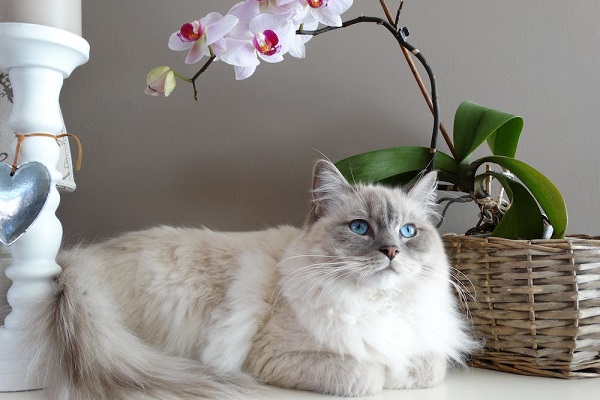If you are, or have ever been a guardian to a domestic feline, you will more than likely have come across one that at some time has experienced urinary problems, such as cystitis and nephritis. If you have the right information [see below], it would be useful in identifying, diagnosing and prescribing homeopathic remedies for such conditions. In addition to providing the suggested first-aid treatments, always consult a veterinarian, if the animal is in distress and/or the ailment has gone on for more than a day, or two.
Cystitis
We all know that cats hide their ailments well and so diagnosing cystitis — a urinary condition that can be potentially dangerous, if left unattended — may be quite difficult. If there are multiple felines in the home, the task of finding the clues that will assist in prescribing the correct homeopathic remedy is even harder.
Cystitis is the inflammation of the bladder which can come about as a result of the cat getting wet, or catching cold, or contracting a bacterial infection chiefly, E coli and Proteus organisms.
Cystitis can be either acute and chronic. Cats with a history of a dry food diet are more prone.
Among the clinical signs are straining in a crouched position; difficulty to void urine; the presence of blood in the urine; increased water consumption; a distended bladder; and, pain. There can be increased body temperature in the early stages.
The cat may make frequent trips to its litter box without voiding, or may urinate in unacceptable places, such as a bathtub, or over a drain. There can also be frequent scratching in the litter box with small amounts voided frequently and very strong-smelling urine.
None of these symptoms are easy to detect, unless the cat is watched carefully and observed in its litter tray. However, once you have determined the symptoms, homeopathy has several options.
Cantharis [Spanish Fly]
This is the first remedy I use in cystitis and invariably with great results. Cantharis is indicated when there is violent inflammation and great burning. Most often, there will be blood in the urine which may be voided in drops. And, there will be great straining. Give one dose of Cantharis 200C, two to three times a day. Slowly decrease the doses upon improvement.
Uva Ursi [Bear Berry]
Uva ursi can be used when there is little, or no urine produced. The animal may be in a state of collapse and cry out in pain. Initially, give a dose of the remedy in 30C at 15-minute intervals for one hour [four doses] and then a dose every 2-3 hours after that. As the animal improves, space the doses and wean off slowly.
Chimaphilla Umbellata [Ground Holly]
In this remedy, the urine will contain more mucous than blood and may be dark green and strong smelling. Suggested dose is 30C, three times a day. If there is no improvement after a day, consult your veterinarian.
The following three remedies are beneficial in chronic, recurring cystitis.
Chronic Cystitis
Causticum [Potassium Hydrate]
In chronic cystitis, Causticum follows Cantharis well and is especially helpful with older cats. Urine is retained, or dribbles and passes slowly. The bladder eventually becomes paralysed as a result of the retention. There is much burning. Give 30C, three times a day, for a few days and then wean off slowly by dropping a dose each day.
Thlaspi Bursa Pastoris [Shepherd’s Purse]
Thlaspi is one of my favourite go-to remedies in all urinary problems, as it is known to replace the catheter. In my experience it produces rapid results. Give one dose of 30C, a day and on improvement wean off slowly by increasing the intervals between doses.
Equisetum Hyemale [Horsetail]
In Equisetum, urinating does not relieve the discomfort. There is a constant desire to urinate and the urine is clear, or light-coloured; it can contain mucus. Give one dose of 30C, a day, weaning off on improvement by spacing the doses.
Nephritis
Acute and chronic inflammation of the kidneys can similarly be treated. Acute forms can be a result of an accident where the kidneys become so shaken, they become inflamed. While this condition can be serious and a veterinarian should be consulted, Apis mellifica and Belladonna are top remedies to consider for acute forms.
Chronic nephritis is usually caused by bacterial incursions in the bloodstream incited by the accumulation of pus from decayed teeth, or inflamed gums. The symptoms to watch out for are great thirst; increased clear urine; weight loss, especially noticeable around the neck and back; sweet, urine-like smell from the mouth; apathy; and, occasional vomiting.
Three remedies to be considered are Mercurius solubilis, Arsenicum album; and, Lespedeza.
Mercurius Solubilis [Mercury]
This remedy is indicated when the urine is cloudy and dirty and smells too bad. It can be mixed with blood. Give 30C, three times a day. Wean off on improvement. If the condition does not improve after a day, immediately consult your veterinarian.
Arsenicum Album [White Oxide of Arsenic]
The cat requiring this remedy has already begun to emaciate. Its skin is dry. It is thirstless, anxious and changes pace often. It drinks little sips and looks for a warm place to lie down. If the animal vomits it smells of dead meat. Give 30C, three times a day. Wean off on improvement. Consult your veterinarian is the condition does not start to improve.
Lespedeza [Bush Clovers]
Lespedeza should be considered if the results of testing reveal waste products and creatine in the blood. If creatine is too high the cat will experience ongoing intestinal difficulties, diarrhoea, vomiting, apathy, and weight loss. Give Lespedeza 1C, three times a day for a week.

